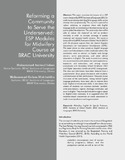| dc.contributor.author | Islam, Mohammad Aminul | |
| dc.contributor.author | Mohiuddin, Mohammad Golam | |
| dc.date.accessioned | 2018-10-28T08:38:19Z | |
| dc.date.available | 2018-10-28T08:38:19Z | |
| dc.date.issued | 2015-12 | |
| dc.identifier.citation | Islam, M. A., & Mohiuddin, M. G. (2015). Reforming a Community to Serve the Underserved: ESP Modules for Midwifery Course at BRAC University. Crossings, Special volume, 118–124. Retrieved from file:///E:/Dspace/2018/October/Faculty%20Publications/Mohammad%20Aminul%20Islam/Crossings_special-volume.pdf | en_US |
| dc.identifier.issn | 20711107 | |
| dc.identifier.uri | http://hdl.handle.net/10361/10777 | |
| dc.description | This article was published in the Crossings [© 2015 ULAB] and the article available at: file:///E:/Dspace/2018/October/Faculty%20Publications/Mohammad%20Aminul%20Islam/Crossings_special-volume.pdf | en_US |
| dc.description.abstract | This paper examines the impact of an ESP
course designed by BRAC Institute of Languages (BIL) for
midwives to develop their English language skills, and to
develop them professionally. The course is expected to
reform midwives, to empower them with English
language skills and professional development by taking
part in global development. The community then will be
able to reduce the maternal as well as newborn
mortality in order to increase coverage of quality
maternal and neonatal health services. The course is
being offered by BRAC Institute of Global Health (BIGH)
with the financial support from the United Kingdom
Department for International Development (DFID).
The paper shows to what extent an English language
course can help midwives in their profession where they
sometimes need to interact in English with foreign
doctors, write prescriptions, and other official
documents in English. The study is carried out among
the course teachers with almost the same experiences,
exposure, and education, and among course
participants with Secondary School Certificate (SSC)
and Higher Secondary Certificate (HSC) backgrounds.
The data and information have been deduced from a
questionnaire, focus group discussions with students,
and observation of their performance. The paper shows
that most of the participants, having limited English
language proficiency, have been able to improve their
basic English communication skills. It also shows that
almost all students can maintain patients’ portfolio,
write prescriptions, reports, discharge certificates, and
so on in English. They even feel relaxed enough to speak
in English when necessary. It is suggested that ESP
modules should concentrate on needs assessment to
make it more productive and target oriented. | en_US |
| dc.language.iso | en | en_US |
| dc.publisher | @ 2015 ULAB | en_US |
| dc.rights.uri | file:///E:/Dspace/2018/October/Faculty%20Publications/Mohammad%20Aminul%20Islam/Crossings_special-volume.pdf | |
| dc.subject | Midwifery | en_US |
| dc.subject | English for specific purposes | en_US |
| dc.title | Reforming a community to serve the underserved: ESP modules for midwifery course at BRAC University | en_US |
| dc.type | Article | en_US |
| dc.contributor.department | BRAC Institutes of Languages | |

